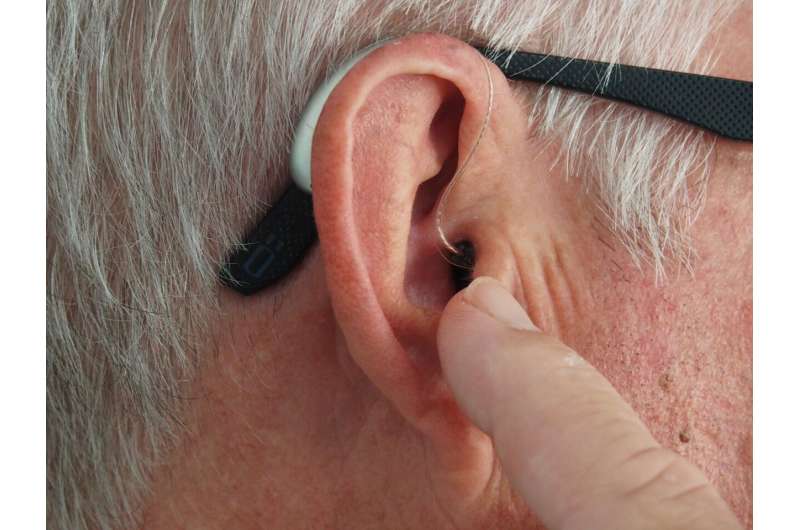This article has been reviewed according to Science X's editorial process and policies. Editors have highlighted the following attributes while ensuring the content's credibility:
fact-checked
trusted source
proofread
Upping your intake of omega-3s may help protect your hearing

Researchers report that blood levels of the omega-3 fatty acid docosahexaenoic acid (DHA) were inversely correlated with hearing difficulty in a new population-based cross-sectional study. Middle-aged and older adults with higher DHA levels were 8–20% less likely to report age-related hearing issues than those with lower DHA levels.
"Higher DHA levels have previously been found to be associated with a lower risk of heart disease, cognitive impairment, and death. Our study extends these findings to suggest a role for DHA in maintaining auditory function and helping reduce the risk of age-related hearing loss," said Michael I. McBurney, Ph.D., a senior scientist with the Fatty Acid Research Institute and an adjunct professor in the Department of Human Health & Nutritional Sciences at the University of Guelph and the Friedman School of Nutrition Science and Policy at Tufts University.
McBurney, a Fellow of the American Society for Nutrition and the Canadian Nutrition Society, will present the findings at NUTRITION 2023, the annual meeting of the American Society for Nutrition held July 22–25 in Boston.
Using data from the UK Biobank, the researchers analyzed self-reported hearing status and blood DHA levels of over 100,000 people 40–69 years of age in the United Kingdom.
After accounting for potential confounding variables, the results showed that people in the highest quintile (one-fifth of participants) of blood DHA levels were 16% less likely to answer yes to the question "do you have difficulty hearing" compared with those in the lowest quintile of DHA levels. Similarly, those in the highest quintile for DHA levels were 11% less likely to answer yes to the question "do you have difficulty following conversations when there is background noise" compared with people in the lowest quintile for DHA levels.
While the results show a significant association between DHA levels and hearing, McBurney cautioned that a cross-sectional population study does not provide enough evidence to definitively conclude that DHA maintains auditory function or that inadequate DHA levels contribute to hearing loss. However, the findings add to a mounting body of evidence of the importance of omega-3 fatty acids, including DHA in particular, to maintain health and help protect against aging-related declines in a variety of body functions.
Omega-3s may help to protect the health of cells in the inner ear or mitigate inflammatory responses to loud noises, chemicals, or infections. Previous studies conducted in older adults and in animals have similarly suggested that higher omega-3 levels are inversely related to and may protect against age-related hearing loss.
Our bodies have a limited ability to produce DHA, so the amount of DHA found in our blood and tissues largely depends on our omega-3 intake. DHA levels can be increased by regularly consuming seafood or by taking dietary supplements.
"There is strong evidence that higher blood levels of omega-3 fatty acids are beneficial," said McBurney. "Fatty fish and omega-3 supplements are both good dietary sources. If choosing to use a dietary supplement, compare products by reading the Supplement Facts panel for eicosapentaenoic acid (EPA)+DHA content."
It is estimated that around 20% of people—over 1.5 billion people worldwide—live with hearing loss, and this number is expected to rise as the population ages in the coming decades. Hearing loss can range from mild to profound; it affects communication and social interactions, educational and job opportunities, and many other aspects of daily life.
Environmental factors as well as genetic proclivities and medicines contribute to hearing loss. Proven ways to reduce the risk of hearing loss include protecting the ears from loud noises by using protective equipment and getting appropriate medical care for infections.
More information: McBurney will present this research at 8:09 a.m. EDT on Monday, July 24, during the Nutrition-related Factors in Aging and Chronic Disease Poster Theater Flash Session in the Sheraton Boston, Fairfax (abstract; presentation details).




















